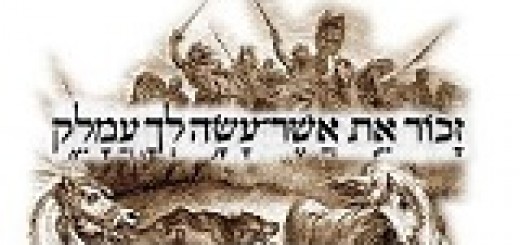Now, the Yechidah level of the soul is even higher than the above mentioned absence of self-awareness of the “Power of Whatness” of Chochmah, which results from the revelation of the aspect of “Ein-Nothingness”, in that “Chochmah is found from nothingness”. Nonetheless the root of Chochmah is specifically drawn from the revelation of radiance from the “Nothingness” – not that it itself is the “Nothingness”.
However, the aspect of the Yechidah is the aspect of the essential self of the G-dly soul, as it is. This is so much so, that it is not applicable to say about it that it undergoes an essential nullification of the self through the sight of the mind’s eye or the like. Rather, it literally constitutes the essential bond of the self to G-dliness. This is the soul as it essentially is, unified and bound to HaShem’s Essential Self above, to the essential Self of the Shechinah (HaShem’s Indwelling Presence). It is similar to a flame still included in the greater fire of the torch, so to speak. It thus constitutes the G-dly nothingness itself, rather than an absence of self resulting from the power of seeing.
(An example of self-negation which is the product of seeing is the prostration of the pilgrims who came to the Holy Temple three times yearly, where they would behold HaShem’s countenance, so to speak. Their absence of self awareness was the result of “seeing” in a way of closeness, as in the verse[1], “To behold the pleasantness of HaShem etc.”)
This is very different than the actual inclusion and bond of the essential self, in which one is never separate from G-dliness altogether, as Rabbi Shimon bar Yochai stated[2], “We are bound by a single bond, I am one with Him, I am enflamed by Him etc.” Similarly, it is written, “In HaShem – literally! – does my soul glory”. This is likewise so regarding the souls of the great Tzaddikim[3], who actually bond and adhere to the Essential Self of G-dliness, as in the verse[4], “May my master’s soul be bound up in the bond of life, with HaShem” – literally!
This is also true of the general Yechidah of the community of Israel as a whole, about which it says[5], “She is embraced and adheres to You etc.” Or as in the verse[6], “Place me as a seal upon your heart etc.” That even though[7], “a Jew may go hither and thither in matters of wisdom and character traits etc., nonetheless, ‘My form’- which is the aspect of the Yechidah -remains within you”, literally with an eternal and essential unity, in which the matter of negation is altogether not applicable, even the essential negation of Chochmah mentioned above. This level of the soul is therefore is called the Yechidah. This is sufficient for the understanding.
(Now, it has been explained elsewhere that the aspect of the Yechidah is specifically vested in the act of fulfilling the mitzvot with the simple, essential faith embedded and concealed in every single Jew, including unlearned and simple folk. This so much so, that ultimately they are capable of giving up their lives for the sake of Torah and mitzvot. This is because of their essential Jewishness, which is higher than the aspect of the “Power of whatness” in them.
This represents the “Heels (or footsteps) of Moshiach” of the very last exile, which constitutes the “Heel (lowest level) of the world of Asiyah (Action). It possesses something of the aspect of the essential self of the Yechidah, which is even higher than seeing “face to face”that was experienced at the giving of the Torah. This is the “Crown of the Good Name” of Moshiach and is the aspect of Nefesh of Asiyah, mentioned above, which is the acceptance of the yoke of heaven as it specifically applies to action. Nonetheless, it is the essential point of Jewishness, with the essential faith of the Yechidah level of the soul. This is the meaning of the verse[8], “Establish the actions of our hands”. It also states[9], “Through Tzedakah (Charity) you shall be established” and[10] “Tzedakah will uplift a nation”. All this is explained elsewhere.)





















